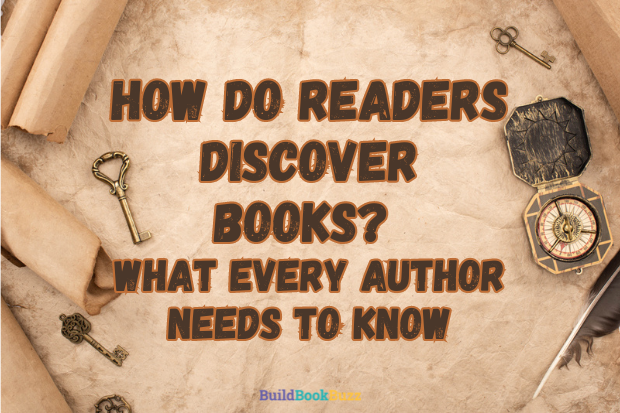How do readers discover books? What every author needs to know
How do readers discover books like yours? Here are eight opportunities for readers to discover, read, love, and recommend yours.
It’s always been hard to get your book discovered, but with the growth of self-publishing, it’s even more difficult.
UNESCO estimates that globally today, 2.2 million new titles are released every year.
Yowza.
In today’s saturated market, understanding how readers discover books can make a significant difference in your success. The more you know about this, the better able you are to focus your efforts in the right places.
Here’s your guide to understanding how readers discover books so you’re better able to get yours in front of them.
Recommendations
Good word of mouth makes a big, big difference.
Personal recommendations from friends and family are influential because they come from trusted sources. We love sharing books we’ve enjoyed; that creates a ripple effect that can greatly boost your book’s visibility.
You’re probably familiar with this from your own reading habits. If a friend likes the same types of books you do, you pay attention when they say, “I loved this book and I think you will, too.”
Recommendations also come from online communities and platforms. Goodreads is the most vibrant community for readers. It’s where they discuss their latest reads, offer recommendations, and create reading lists.
For example, when one of my daughter’s friends and I discovered we loved the same books while talking at a wedding, she quickly jumped to, “Are you on Goodreads? Let’s connect there!” It’s a great way for us to quickly see not only what each other is reading, but whether we like those books, too.
Other influential online gathering places for readers include Facebook (it has groups dedicated to readers of nearly every book niche imaginable), Library Thing, Riffle Books, and Reddit, among others.
Engaging with these communities can help your book reach a wider audience.
Collaborations
One of the best – and possibly most overlooked – ways to get discovered by more of the right readers is to collaborate with authors and other types of product or service creators who already reach your target audience.

A newsletter swap is an easy way to collaborate. You and an author who reaches your audience recommend each other’s books to your newsletter subscribers.
You can also swap guest blog posts, host Q&As, or plan Instagram or Facebook Live events for each other’s followers.
Online platforms
Online platforms and their algorithms are key players in book discovery today, too. Selling your book on Amazon is a no-brainer. It’s where most people who buy books online buy them. It’s also where they review them.
They review them on Goodreads, too, so in addition to using Goodreads as a reader, you’ll want to claim your author account there so you’re more directly connected to your book on that site.
The same goes for BookBub, which is both a site and service created specifically to help readers discover more of the books they enjoy reading.
These options are all pivotal for book recommendations because they use complex algorithms to suggest books based on a reader’s past behavior and preferences.
When you list your book on these platforms and optimize your metadata on each, you enhance your book’s discoverability.
Reviews
You also know that reviews and ratings on these platforms are important.
Positive reviews can boost your book’s ranking and visibility, while detailed feedback can help potential readers decide to pick up your book.
Positive reviews can boost your book’s ranking and visibility, while detailed feedback can help potential readers decide to pick up your book.
Don’t expect them to happen organically, although that can and does happen, of course. Instead, encourage your readers to leave honest reviews that will help you maintain a steady flow of new readers.
Traditional and digital media
Media coverage, both traditional and digital, significantly impacts book discovery. This news media attention known as publicity can help your book reach a broader audience.
Media coverage, both traditional and digital, significantly impacts book discovery. This news media attention known as publicity can help your book reach a broader audience.Click to tweetDon’t overlook the power of magazine and newspaper reviews; they’re still influential, especially with older demographics.
Visibility in online publications and blogs has become essential because readers turn to trusted bloggers and online magazines for book recommendations.
Trade magazine publicity – both reviews and interviews – can be important for certain nonfiction books, so be certain to explore that.
Securing coverage on popular book blogs can drive significant interest and sales, but so can interviews and guest posts on subject/topic blogs.
For example, if your romance novel is set in Door County, Wisconsin, pitch Door County bloggers (yes, they exist, I checked) on a review or Q&A with you on why you chose that setting.
Podcast publicity is increasingly important for authors, too, as more and more people are drawn to the specificity of podcasts. As with blogs, pitch an author interview with book podcasts, but also approach topic podcasters, as well.
Social media
As we’ve seen with BookTok on TikTok, social media has revolutionized how readers discover books.

Social media didn’t exist when my first book was published.
It was a humor book that took a lighthearted look at male behavior, explaining to women why men do what they do or say what they say. The topic is perfect for social media, so I can only imagine the impact these platforms would have had on sales.
Today, in addition to TikTok, Instagram, Facebook, and Twitter are homes to vibrant book communities that actively share and discuss their latest reads.
Instagram hosts book group accounts (think Reese’s Book Club), YouTube has BookTube, and Facebook (mentioned above) is home to lots and lots and lots of genre readers groups.
Reader communities also have their own gathering place on Twitter/X with Twitter Communities.
Are your readers on Threads? That newer social network lets users create groups (Book Threads) that become mini-communities, too.
The best way to work toward book visibility in any online group is to become an active member and participant first. Showing up as a marketer, especially before you understand a group’s vibe and personality, is a waste of time.
Bookstores and libraries
Let’s not overlook how many people rely on browsing through physical bookstores and public libraries for books they might enjoy.
Fact is, while many self-published authors release only as e-books, most people still prefer physical books. Even Gen Zers prefer that format.
Curated displays in both stores and libraries plus bookstore staff recommendations can spotlight your book to new audiences.
Case in point: When I attended an NYU School of Professional Studies webinar on how Braiding Sweetgrass became a best-seller six years after it was published, I learned it was through the power of independent bookseller recommendations. Pretty cool, isn’t it?
As for libraries, many readers rely on them almost completely for reading material. That means library programs that include “lunch and learns,” book clubs, and author talks can introduce your book to new-to-you readers.
What can you do today to get better plugged in to your local library’s programs?
In-person engagement
One of the best ways to maximize discovery and good word of mouth, though, is meeting readers in person, face to face.
Author signings, book tours, presentations, and literary festivals allow you to connect with your audience directly on a personal level. These events create memorable experiences that can turn attendees into loyal readers.
Virtual events. including virtual book tours, webinars, and summit workshops. have also become popular, especially since the pandemic.
They offer the advantage of reaching a global audience without the need for travel. Participating in or hosting virtual events can help you connect with readers from different parts of the world, too.
Advertising
Paid advertising on Amazon, where readers are looking for books, can pay off under the right circumstances. Many authors also have success advertising on Facebook, where they can target specific demographics and interests.
Both options help your book reach potential readers who are likely to be interested, as long as your Amazon detail/sales page is “optimized” and you understand how to create and buy effective ads.
How will readers discover books by you?
Considering how many ways authors discover your books, where should you put your efforts to make sure yours gets found?
There’s no pat answer for this. With the exception of selling on Amazon, what will make the most difference for one author might not be the best choice for another.
For example, novelists get more traction on Goodreads than nonfiction authors do. And, some authors are so uncomfortable with in-person events that while they’re great for visibility, they’re not worth the stress.
Choose your discoverability channels – social media, publicity, advertising, and so on – according to where you’ll find your readers, your skills, and your interests.
But do something. Don’t wait to be discovered. You have to make it happen.
FAQs about how readers discover books
1. How important are personal recommendations in helping readers discover books?
Personal recommendations are incredibly influential in book discovery.
Readers often trust friends, family, and even online communities like Goodreads for book suggestions. These recommendations create a ripple effect that can significantly boost a book’s visibility, as people love sharing books they enjoyed.
Engaging with these communities can help authors connect with potential readers and spread the word about their books.
2. How can collaborating with other authors help in book discovery?
Collaborating with other authors can be a highly effective way to reach new readers.
Authors can participate in newsletter swaps, guest blog posts, or co-host events like Instagram Lives or Q&As. These collaborations allow authors to tap into each other’s audiences, increasing exposure to readers who are already interested in similar genres or topics.
This strategy can be particularly powerful in niche markets.
3. Why is a presence on platforms like Amazon and Goodreads crucial for authors?
A presence on platforms like Amazon and Goodreads is crucial because these sites are primary destinations for readers searching for books.
These platforms use algorithms to recommend books based on user behavior and preferences. By listing their books and optimizing metadata on these platforms, authors can enhance their discoverability.
Reviews and ratings on these sites also play a significant role in attracting potential readers, making it essential for authors to encourage reviews.
4. What role does traditional and digital media play in book discovery?
Traditional and digital media can significantly impact book discovery by reaching broad and targeted audiences.
Media coverage, such as magazine and newspaper reviews, remains influential, especially among older demographics. Digital media, including blogs and online publications, offer a more accessible and often cost-effective way to gain visibility.
Authors can pitch to book blogs, podcasts, and online magazines to secure reviews, interviews, and features, driving interest and sales.
5. How can social media influence book discovery, and which platforms are most effective?
Social media has revolutionized book discovery by creating vibrant communities where readers share and discuss their favorite books.
Platforms like TikTok (BookTok), Instagram, Facebook, Twitter/X, and newer networks like Threads have dedicated spaces for book lovers. Authors can build a presence on these platforms, participate in discussions, and engage with readers.
The key is to be an active and genuine participant rather than solely promoting books. Each platform has unique features that can be leveraged, such as Instagram’s visual appeal, TikTok’s short video format, and Facebook’s extensive group communities.
What are you doing to get discovered that’s working for you? Please tell us in a comment.
Like what you’re reading? Get it delivered to your inbox every week by subscribing to the free Build Book Buzz newsletter. You’ll also get my free “Top 5 Free Book Promotion Resources” cheat sheet immediately!


Excellent article! Great ideas — I just shared this with two first-time authors.
I’m glad you like it, Peggy! And thanks for sharing it. I hope it helps the authors you work with.
Sandy
The big problem is that this, and life in general, takes so much time that I find there’s no time for writing. Especially since I am a member of two online critique groups that I find invaluable. But you have to crit several other postings (rightly) that it takes a lot of time.
I agree that it takes a lot of time. Those who write simply for the joy of it with no expectations that people will read their work can skip all this — which has to be liberating. But those who want people to read their books? They have to figure out how to balance all of it so they have time to both write and market. It’s really unfortunate.
Sandy
Excellent summary!! Thanks so much for sharing! For someone trying to market their book (s) it is a goldmine! It takes so many hours to learn the ins-and-outs of marketing and this was helpful. I still enjoy the art of writing the MOST! To strike a balance, as you wrote, is the key.
Thank you!
Thanks for the feedback, Mary! I’m SO glad it was helpful. Getting that balance can be tricky. I’ve found that blocking out the same time every week for marketing helps make sure I get it done, but something else might work for you, right?